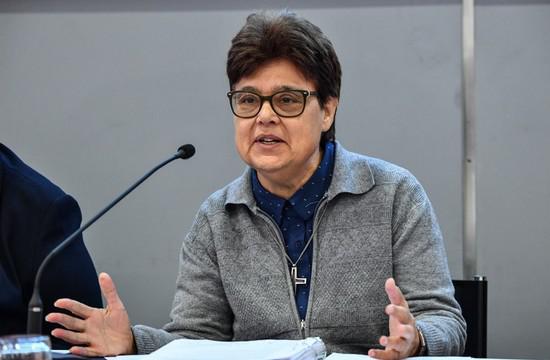|
Abuse in the Church: 'If people are not aware of an issue, they do not perceive it'
By Céline Hoyeau
The president of the International Union of Superiors General discusses last week's Rome Meeting on the Protection of Minors in the Church In this interview with La Croix, White Sister Carmen Sammut, who is president of the International Union of Superiors General (UISG), discusses last week's Rome Meeting on the Protection of Minors in the Church in which she took part. La Croix: What was your experience of the meeting on the protection of minors? Were you changed personally over the course of the event? Sister Carmen Sammut: I had already met several people who had been abused but not by priests. I have worked with young people from various countries who have been abused, some of whom sometimes took up to two years to explain to me why they were drawing the things they were drawing. What most struck me listening to the testimonies over the last few days was the seriousness of the impact of the fact that the abuser was a priest or religious, i.e. someone who represented God in the mind of the child. Their whole lives are torn apart, not just their bodies but their faith, their confidence in others, as well as their confidence in institutions that should have protected them as children. That greatly upset me and helped me to position myself in the debate during the summit. On what points in particular? For example, when we spoke of zero tolerance. I was the reporter for an English-speaking group. It is clear to me now that if a priest is found guilty of having abused a child then he can no longer remain a priest. Because the priest represents God and how can he represent a God of life when he causes death, so to speak? Several of us agreed on this view. Not everyone had the same starting point. Some still hesitated over the extent of the problem in their own countries, particularly the bishops of Eastern Europe. But in the end, everyone agreed that it was their duty to pay attention to this problem. I noticed this in the responses of various people but also because some recognized that they needed help and requested resources. This was encouraging because we can only perceive what we already know. If we are not aware of an issue, we don't perceive it. Did you discuss abuse by religious sisters or is that still a taboo subject? It was not taboo and we did speak about it. Overall, however, the meeting was focused on priests, bishops and religious men, more on men. We had sent a request to our delegates to report cases but unfortunately we have not yet received many responses. It still needs to be worked on. In any case, many of our congregations have long had protocols in place. In my congregation, for example, every sister signs a code of conduct on personal responsibility from the beginning of her postulancy. Victims associations have expressed their disappointment. Do you understand this? Do you think that this meeting will lead to anything concrete? Several concrete measures have already been announced, including the pope's motu proprio, the vademecum which will soon be distributed and the expert task force that will assist bishops' conferences. In each group, we also raised issues discussed that the dicastery heads will also need to tackle. They were to meet on Monday and I hope something concrete will emerge from that. At a personal level, attitudes have already changed. People have opened up a little bit to synodality, i.e. not just working among bishops (collegiality) but also with religious men and women and lay people. That is a sign of hope. What women said during the meeting attracted a lot of attention. Do you think that the summit will lead to a transformation in which the Vatican will offer them a greater place in the future? I hope so. Women are closer to life, to what people feel, what people see, what people hear because we are closer to those who suffer. We have done a lot to enable women to have a place of their own. And I note that we are increasingly called upon. Our colleagues in the UISG are in the process of lobbying for both men and women religious to have the right to vote during these synods.
|
.
Any original material on these pages is copyright © BishopAccountability.org 2004. Reproduce freely with attribution.
